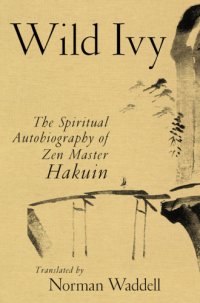
Ebook: Wild Ivy: The Spiritual Autobiography of Zen Master Hakuin
Author: Hakuin Ekaku Norman Waddell
A fiery and intensely dynamic Zen teacher and artist, Hakuin (1685–1768) is credited with almost single-handedly revitalizing Japanese Zen after three hundred years of decline. As a teacher, he placed special emphasis on koan practice, inventing many new koans himself, including the famous "What is the sound of one hand clapping?" This English translation of Hakuin’s intimate self-portrait includes reminiscences from his childhood, accounts of his Zen practice and enlightenment experiences, as well as practical advice for students.
Amazon.com Review
The most important Japanese Zen master after Dogen, Hakuin reinvigorated Rinzai Zen through an emphasis on the uncompromising pursuit of enlightenment. Such a relentless pursuit can be found in the pages of his autobiography Wild Ivy. After being scared out of his wits by a Nichiren priest lecturing on the fires of Hell, Hakuin left home at the tender age of 14. He set himself to practicing but vacillated, alternating between fervent effort and doubt. Wild Ivy tells honestly of the ups and downs of Zen training, of peak satori experiences, and deflating conundrums. Perhaps the great value of this book is the human face that Hakuin manages to put on a centuries-old tradition by offering details from his own life. For instance, take his story of being beaten unconscious by a crazed woman with a broom and coming out of it with a penetrating understanding of the impenetrable Koans he had been working on. Through his merciless practice, Hakuin also experienced a physical deterioration, or "Zen sickness," and relates the storybook account of his ascending a remote mountain to glean the secret method of introspective meditation from a cave-dwelling hermit. Hakuin believed that even after satori, one must never stop practicing. Teaching is one method of practice, and Wild Ivy stands as one of Hakuin's great teachings. --Brian Bruya
From Library Journal
An 18th-century Japanese Zen master considered the father of modern Rinzai Zen, Hakuin is best known as the author of the well-known koan "what is the sound of one hand clapping." His writing stresses, among other things, the central importance of zazen (seated meditation) in Zen practice. This is a representative text from this important figure.
Copyright 1999 Reed Business Information, Inc.
Review
“Norman Waddell presents the cranky, impassioned master Hakuin with an uncanny sense of Right English. Now we know you, old Hakuin.”—Robert Aitken, author of The Practice of Perfection and Taking the Path of Zen
“A rich and rare glimpse into a Zen master's comments on his own spiritual journey, translated for the first time. A welcome and recommended addition to the canon of Zen literature available in English.”—Library Journal
About the Author
Hakuin is the most important of the Japanese Zen artists; indeed, he is one of the greatest artists of any kind in world culture. Tremendously creative and productive, creating perhaps as many as 20,000 thousand Zenga in his lifetime as well as having thousands more pieces printed from woodblocks Hakuin's work is now appreciated all over the world.
Amazon.com Review
The most important Japanese Zen master after Dogen, Hakuin reinvigorated Rinzai Zen through an emphasis on the uncompromising pursuit of enlightenment. Such a relentless pursuit can be found in the pages of his autobiography Wild Ivy. After being scared out of his wits by a Nichiren priest lecturing on the fires of Hell, Hakuin left home at the tender age of 14. He set himself to practicing but vacillated, alternating between fervent effort and doubt. Wild Ivy tells honestly of the ups and downs of Zen training, of peak satori experiences, and deflating conundrums. Perhaps the great value of this book is the human face that Hakuin manages to put on a centuries-old tradition by offering details from his own life. For instance, take his story of being beaten unconscious by a crazed woman with a broom and coming out of it with a penetrating understanding of the impenetrable Koans he had been working on. Through his merciless practice, Hakuin also experienced a physical deterioration, or "Zen sickness," and relates the storybook account of his ascending a remote mountain to glean the secret method of introspective meditation from a cave-dwelling hermit. Hakuin believed that even after satori, one must never stop practicing. Teaching is one method of practice, and Wild Ivy stands as one of Hakuin's great teachings. --Brian Bruya
From Library Journal
An 18th-century Japanese Zen master considered the father of modern Rinzai Zen, Hakuin is best known as the author of the well-known koan "what is the sound of one hand clapping." His writing stresses, among other things, the central importance of zazen (seated meditation) in Zen practice. This is a representative text from this important figure.
Copyright 1999 Reed Business Information, Inc.
Review
“Norman Waddell presents the cranky, impassioned master Hakuin with an uncanny sense of Right English. Now we know you, old Hakuin.”—Robert Aitken, author of The Practice of Perfection and Taking the Path of Zen
“A rich and rare glimpse into a Zen master's comments on his own spiritual journey, translated for the first time. A welcome and recommended addition to the canon of Zen literature available in English.”—Library Journal
About the Author
Hakuin is the most important of the Japanese Zen artists; indeed, he is one of the greatest artists of any kind in world culture. Tremendously creative and productive, creating perhaps as many as 20,000 thousand Zenga in his lifetime as well as having thousands more pieces printed from woodblocks Hakuin's work is now appreciated all over the world.
Download the book Wild Ivy: The Spiritual Autobiography of Zen Master Hakuin for free or read online
Continue reading on any device:

Last viewed books
Related books
{related-news}
Comments (0)